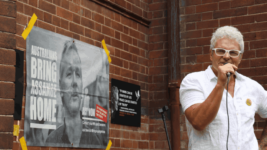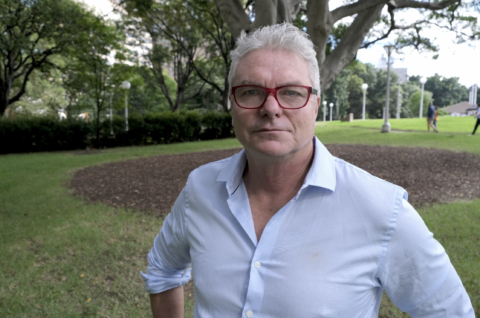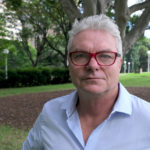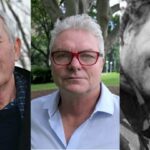“I Am Proud of the Position I Have Taken”: ADF Whistleblower David McBride on Standing Up for Truth

The 17th recommendation made in the May 2021 report of the Senate inquiry into press freedom was that the Commonwealth Director of Public Prosecutions reconsider continuing the case against ADF whistleblower David McBride “on strong public interest grounds”.
The inquiry was convened after the notorious mid-2019 AFP press raids, which included federal agents inspecting the computers of the journalists who reported on the classified documents that McBride, a former Australian Defence Force lawyer, leaked to them over 2014 to 2016.
The information McBride supplied to the national broadcaster formed the basis of the 2017 Afghan Files report, which revealed that certain Australian Special Forces officers in Afghanistan had been perpetrating war crimes in the Central Asian nation.
As the Senate report notes, co-author of the ABC report journalist Dan Oakes was initially charged over having received classified information, but the matter was subsequently dropped.
And despite the inquiry’s recommendation, McBride is still set to go before the courts over his actions next year.
Punishing the messenger
Then attorney general Christian Porter saw McBride charged with five federal offences relating to his disclosure in 2018. And from there, the lawyer was to argue his right to have publicly blown the whistle, citing the defence provided in the Public Interest Disclosure Act 2013 (Cth).
The PID Act, which was drafted early last decade by current attorney general Mark Dreyfus, has long been known as flawed, as it establishes a pathway for those attempting to expose government corruption which is too convoluted, while the protections it provides disclosers are weak.
However, McBride didn’t get to put his public interest disclosure defence to the ACT court, as when he turned up to do so in October, the Attorney General’s Department successfully applied an order to his case, which made it futile to do so.
And it was only after McBride’s use of the PID Act had been avoided, and fellow whistleblower Richard Boyle had argued his defence under it, that AG Dreyfus introduced an amendment bill in late November, which aims to improve the protections for disclosers, like them, in the future.
“Truth is a lonely warrior”
Another shadow of doubt cast over McBride’s case is that in late 2020 the government commissioned Brereton inquiry into war crimes perpetrated by Australian soldiers in Afghanistan delivered its report, which basically supported David’s decision to blow the whistle.
And even though the Brereton report recommended 36 matters involving 19 Australian troops be investigated as possible war crimes, two years later, the only person charged with any crime is McBride: a man who was trying to bring misconduct to an end, not perpetrate it.
Sydney Criminal Lawyers spoke to lawyer David McBride about what was dished up by the prosecution when he was to argue his defence, the very real prospect that he’s going to be serving time in the future, and how he’s proud of the action he’s taken.

On 27 October, you were set to go before the ACT Supreme Court to argue your public interest disclosure defence under the Act, but the hearing didn’t go ahead, as your legal team found it futile to continue.
The reason for this was not only was there a national security information order shrouding the case in secrecy and the prosecution was set to challenge your two witnesses, but at the last minute, a public interest immunity order was issued, which meant any evidence you had could be removed.
David, how did you deal with the prosecution taking matters to the extent that you were basically blocked from arguing your defence?
A lot changed for me that day. Up until that point, I always thought I had the law on my side and that I would ultimately win my case. But at that point, a lot changed.
The public interest immunity claim was made the day before. And our sources tell me that even the attorney general was not particularly happy about it. It wasn’t made by him.
It was made by defence or security services, or someone else who comes under the banner of the Attorney General’s Department but not actually the attorney general. Dreyfus was powerless to do anything about it.
Bret Walker, who is undoubtedly Australia’s best barrister in this area, said that we could protest, but we wouldn’t win against it, meaning that even the judge would have to honour the prosecution if they insisted all our evidence was national security related.
It made me think that we’ll have the same problems in the jury trial, and I went from believing that I would be acquitted to believing that I will be convicted.
That doesn’t mean that I’m downhearted in the long run. I’ve always thought that perhaps the only real change will come from some sort of sacrifice or prison term on my behalf, which will make people look at this case and think whether it looks right.
To think about whether we need to change our systems in Australia that see people who actually report crimes ending up in gaol themselves.
Just weeks after Richard Boyle argued his defence and you were meant to have argued yours under the Public Interest Disclosure Act, attorney general Mark Dreyfus introduced reforms to the legislation, and he’s set to give it a further overhaul next year.
It’s well understood that the whistleblower laws within the Act that were supposed to provide you with protection are lacking.
Was this sequence of events problematic in your mind?
It’s hard not to see this all a little bit Kafkaesque. On the one hand, you’ve got the new government talking about whistleblower protections and amending the rather flawed Public Interest Disclosure Act.
On the other hand, the same government department is running prosecutions based on the flawed Act and not even seeing that there’s anything wrong with that, and nor would the relatively piecemeal changes they’re making to the Act make any real difference to Richard Boyle and myself.
The imaginary public interest disclosure that they’ve based the Act around seems to have no bearing on people like Richard Boyle and myself.
It would have been better basing the whole Act around our cases or cases like ours, rather than making up some mythical case that doesn’t seem to bear any relation because even with the tinkered changes, the Act won’t work.
I didn’t even get to use the Act. It’s yet to be seen whether Richard Boyle will be successful under it.
But if he is successful, it won’t be because of the central issue that he complained about in relation to the ATO was wrong and that he did the right thing in trying to change the course of the actions of the government department. And that’s the most important issue.
Rather, it will be due to all these peripheral things that the Act deals with, like did he report to the right delegate, or did he report within the right timeframe, all these aspects have become the focus, rather than the actual issue.
We don’t really want protections. Most of us want accountability.
The main strength of the common law approach to whistleblowers was that the judge would look at the harm complained of and weigh that up with the harms caused by the disclosure and that would mean that there was a weighing up and a judge looked at what the department had done wrong.
The problem with the Act is that it doesn’t become a focus, even though the publicity around what the department actually did wrong, can be very powerful in making things right.
But under the Act, we don’t tend to look at what the department did wrong and that is a weakness.
I would like to see whistleblowers judged on what they were trying to report and their bona fides, rather than whether they went through the various hoops, according to the Act.
So, you don’t hold much hope for Dreyfus’ whistleblower reforms?
No. They’re a waste of time.
As a lawyer who was working for the Australian Defence Force at the time you blew the whistle, how do you consider the legalities around the way your case has been handled?
I always try to be balanced about it. In relation to the AFP who dealt with me, I thought that they did so very fairly.
I am concerned when I see dissenters taking up arms against the police. I don’t think that can be a good thing. And I’ve often thought you are better off getting arrested on spurious grounds and then fighting your case from gaol, rather than to see it as a war against police.
The AFP, as I say, treated me fairly. I’ve got no problems with them. They handled it well. And I’ve always said that if I’ve broken the law, I’m prepared to go to gaol.
The Department of Defence see it as a sort of death match or a grudge match. It appears that they are the ones driving the case.
It is not all of them. There are obviously good people in Defence. But the department itself is taking an overly vindictive approach and it’s a shame that the government or the Attorney General’s Department doesn’t seem to distinguish themselves.
This is one of the problems I complained about. There is an idea of team government, which is a problem because the Attorney General’s Department are meant to be the arbiters of law in Australia, not just in the government.
So, if they always join sides and take the position of the department against the whistleblower, it means that the whistleblower is outgunned necessarily, and it totally discounts the fact that the whistleblower may be right.
We’ve seen that in the Robodebt Royal Commission, which is instructive for my case. Clearly, the dissenters in those departments and the brave frontline worker from Centrelink were right.
If they applied the same tactics from my case as in Robodebt, that would mean the attorney general would be necessarily fighting any dissenters against the Robodebt scheme.
Now, that’s clearly wrong. The whistleblowers and the dissenters against that scheme did the right thing, and the arbiter of law and order in this country, the attorney general, should look at these cases with an open mind, rather than fighting them on behalf of the department.
We saw the most extreme extent of this in Richard Boyle’s case, when the ATO applied for suppression orders as if it was a national security case, even though it was a case about the tax department carrying out garnishee orders excessively against small businesspeople.
That cannot possibly be national security information, yet the attorney general allowed for the suppression order to be considered, which they lost. But it’s pretty embarrassing.
There needs to be an independent whistleblower agency that helps in that regard, as there needs to be some sort of separation, so the attorney general doesn’t inevitably end up fighting whistleblowers just because they’re complaining about another government department.
The whistleblower may be right, and the attorney’ general’s role is not necessarily to crush them.
The point is often made that while the Brereton report referred matters to the AFP to be investigated as potential war crimes, you’re the only one to have been charged in relation to what occurred in Afghanistan.
In regard to Brereton, what are your thoughts on the lack of action in its wake?
Again, it’s Kafkaesque. You’ve got a man who has been on international TV shooting an Afghan man holding prayer beads dead in a field. He hasn’t been charged. But I’ve been charged for four years, and I’m facing life in prison.
There is no logical explanation for this.
But in some ways, it’s one of my greatest strengths, as I see it. I might be convicted but I’ve spoken to people all over Australia from all walks of life and they find that fact very startling: that I am the only one to have been charged out of the whole war on terror.
I’m likely going to be railroaded and perhaps, that will be my greatest strength, like a pebble in the shoe, as people find that hard to stomach.
The last recommendation of the 2021 Senate inquiry into press freedoms was that the prosecution consider dropping your case.
Calls for ending your prosecution have been long and varied, however, with the change of government, Collaery’s prosecution was dropped, not yours.
In your opinion, why has this distinction been made?
It’s hard not to be cynical about it. There are a couple of factors in that regard. While Collaery’s prosecution was dropped, there was no inquiry into whether the bugging really happened, whether it should have happened or who approved it. And that I find very unsatisfactory.
If they were genuinely embarrassed about Collaery’s prosecution, you would have thought there would be an inquiry into how it actually happened.
What’s also strange is that if they were genuine about thinking this was a terrible thing, then you would have thought that they would pardon Witness K. But he’s still got a conviction.
So, they seem to think he did the wrong thing. That’s rather peculiar. I tend to think the only reason that they dropped Collaery’s case was not to help Collaery but to help themselves.
Woodside is a big donor. In some ways Christian Porter wasn’t a particularly strategic thinker. He wanted to punish Collaery and K on behalf of whoever he thought he was getting revenge for.
But Porter didn’t realise that the case, which was not well known by the Australian public, would suddenly become very well known.
Everybody knew about the allegation. Every time Bernard Collaery went to court, the allegation that Australian spies bugged the East Timorese cabinet offices in order to benefit an oil company that Alexander Downer eventually worked for was getting washed and washed through the public.
Porter shot himself in the foot because the prosecution made this allegation go around the world. I would think those on the other side of that, ASIS, Downer and Woodside, whatever the truth of the allegation, must have breathed a sigh of relief after the Collaery prosecution was dropped.
Politically, it was also a good chance for the ALP to bash the LNP, in that it was a purely LNP case with the bugging taking place during the Howard years and it was obviously during the Morrison years that the prosecution went ahead. So, it was politically safe ground.
My case seems to be like Julian Assange’s, where there is sympathy for whistleblowers when the parties are in opposition, but when they get into power, the security services have meetings with them, and they have very strong things to say.
The security services turn the government around on these people, who they might have had sympathy for before, but they now claim are very bad people.
This is a particularly sinister process because there is no procedural fairness. I don’t know what the security services are saying to the prime minister and the attorney general about me, I don’t get a chance to refute it.
And the idea that there is this deep state running things behind the scenes, outside the courtroom and outside of our democratic processes, is very concerning.
Again, it will look strange if I go to gaol and Bernard Collaery is not even going on trial. It would be nice if Mark Dreyfus would explain the difference. But he refuses to.
You’re paying a high price over having exposed the way the ADF was operating in Afghanistan. How would you say your public disclosure has impacted?
I am proud of it. Obviously, the government considers me a criminal. But I’m very buoyed every time I speak with someone from the Afghan Australian community, as they treat me as a hero.
They’re not necessarily guided by the press and the mainstream media. Unlike us, they don’t necessarily take their opinions from what gets told to them by media outlets.
To them I’m a hero, and that means the world to me.
A lot of people who do follow the news, the people who read your columns, people who are real news junkies, they think I’m a hero as well. And what I mean by news is independent news.
They can see why it’s good for them to see there are people within the security services, as I was, who stand up for truth and stand up for justice.
So, I’m very proud of that. It could be a turning point where people realise that not everybody who is in uniform is necessarily going to toe the company line, because some people regard values more important than state survival.
Some people are willing to stand up for truth.
I’m very proud of that. And I think eventually we’ll be on the winning side. It is great to be on the right side of history.
And lastly, David, your public interest defence was blocked, and you’re set to go before the courts next year facing five federal offences that could see you spend a long time in prison.
How are you feeling about it all at this point?
I feel good about the big picture stuff. I feel wonderful about the people I have met along the way. I feel a little bit like the partisans in the Italian and French resistance fighting the Germans in the Second World War.
My daughter and I, we watch a lot of TV together and we love Money Heist and the way they sing the song Bella Ciao.
I do feel like that. I feel like I am going to be convicted. I do feel that I will get a long sentence, with the maximum being unlimited. Even if the judge has some sort of sympathy for me, it will be hard for him not to give me 20 years, even with a discount of 20 percent.
So, I am strangely optimistic about it, because I can only believe that the public will be quite outraged by this and either the High Court appeal, or simply the fact that it does not sit right with the public, will eventually, after a year or two, see me released.
But we will see. And again, I’m grateful to be involved in something bigger than myself. I am so grateful to you. I am so grateful to all of my supporters.
I’ve met some fantastic people along the way. I don’t know how things are goings to turn out. But I am proud of the position I’ve taken.







